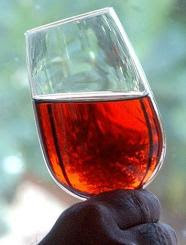 NO, I'M NOT just going to remind you how much the French hate Robert Parker (who knew?). There was another story that caught my eye in the morning paper. Time for a little report. You know those tiny gold medals that appear on wine labels? It turns out they're mostly meaningless:
NO, I'M NOT just going to remind you how much the French hate Robert Parker (who knew?). There was another story that caught my eye in the morning paper. Time for a little report. You know those tiny gold medals that appear on wine labels? It turns out they're mostly meaningless: Writing in the Journal of Wine Economics, retired Cal State Humboldt professor Robert Hodgson said he looked at the results for more than 4,000 wines entered in 13 U.S. competitions in 2003 and found little consistency in what wines won gold medals. The study found that of almost 2,500 wines that were entered in more than three competitions, 47% won a gold medal in at least one contest.
However, of those gold medal winners, 98% were regarded as just above average or below in at least one of the other competitions. Hodgson said that demonstrated how little consistency there was."Of the wines that entered five competitions and got at least one gold, about 75% also received no award in at least one of the remaining competitions," he said.
In recent years, wine tasting has become a surprisingly popular experimental subject. Neuroscientists at Cal-Tech conducted an elaborate taste-test of California Cabernets in a brain scanner - more expensive wines taste better, even when they're actually cheap plonk gussied up with a pretend price tag - while Frederic Brochet, a cognitive psychologist at the University of Bordeaux, explored the sensory frailties of wine "experts".
The Brochet experiment went like this: he invited 54 experienced wine tasters to give their impressions of a red wine and a white wine. Not surprisingly, the experts described the wines with the standard set of adjectives: the red wine was "jammy" and full of "crushed red fruit." The white wine, meanwhile, tasted of lemon, peaches, and honey. The next day, Brochet invited the wine experts back for another tasting. This time, however, he dyed the white wine with red food coloring, so that it looked as if they were tasting two red wines. The trick worked. The experts described the dyed white wine with the language typically used to describe red wines. The peaches and honey tasted like black currants.
According to Brochet, the lesson of his experiment is that our experience is the end result of an elaborate interpretive process, in which the brain parses our sensations based upon our expectations. If we think a wine is red, or that a certain brand is better, then we will interpret our senses to preserve that belief. Such distortions are a fundamental feature of the brain.
But the news for wine experts isn't all bad. A large study published last year demonstrated that, although there's a slightly negative correlation between the price of a wine and the pleasure it gives wine amateurs, oenophiles actually derive more pleasure from more expensive wines, even when tasted blind.Whew!In a sample of more than 6,000 blind tastings, we find that the correlation between price and overall rating is small and negative, suggesting that individuals on average enjoy more expensive wines slightly less. For individuals with wine training, however, we find indications of a positive relationship between price and enjoyment. Our results indicate that both the prices of wines and wine recommendations by experts may be poor guides for non-expert wine consumers.

4 comments :
I've been trusting Guide Hachette, now you have me doubting...but I do love a good vin jaune :) labelled or not.
Is the logical extension that my "World's best dad" t-shirt is a bit doubtful, to say the least, in it's universal authority?
Torbjorn, I highly doubt it. You're at least in the running, no?
I don't think the French vintners really hate Robert Parker since he has done a great deal to promote their wines or at least the wines that are made to match his taste profile. Then everyone tries to match them. I think they dislike anyone who can move a market like he does. I wish more people would ignore and make wines that are not alcohol fruit bombs for Parker. I also think the people who live in Provence don't really hate Peter Mayle as they sure love what he has done to house values and for tourism in the region. Its like complaining about the weather in Provence.
Michel
Post a Comment